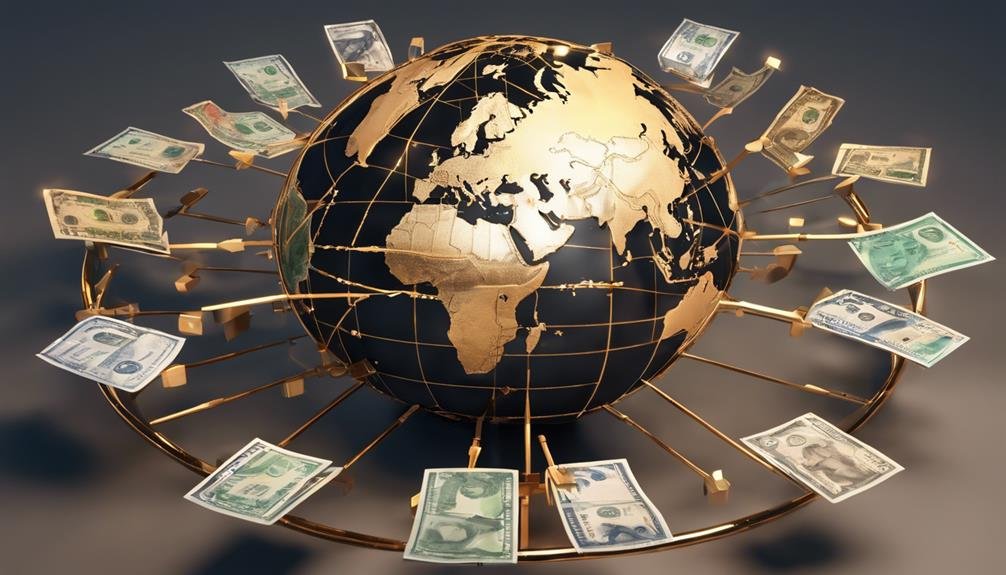Balance of Payments in Global Transactions: Why Does It Matter?
Understanding the balance of payments in global transactions is essential as it showcases a country's financial interactions globally, indicating economic stability and policy effectiveness. It offers detailed insights into trade dynamics, financial health, and potential imbalances, vital for sustainable economic growth. The evolution of BOP systems, influenced by economic factors, reflects efforts to enhance efficiency and adapt to changing financial landscapes. Policymakers rely on BOP data to evaluate economic performance, guide policy decisions, and maintain a favorable global position. BOP impacts the interconnected dynamics of the global economy, shaping trade relationships and financial flows between nations, highlighting the competitiveness and challenges faced.
Key Takeaways
- BOP reflects a country's international financial transactions and economic stability.
- It provides insights into trade dynamics, financial health, and policy effectiveness.
- Influences global trade relationships, financial flows, and competitiveness.
- Essential for policymakers to gauge economic indicators and address trade imbalances.
- Crucial for navigating the complexities of the interconnected global economy effectively.
Importance of BOP in Economics
The significance of the Balance of Payments (BOP) in economics lies in its thorough portrayal of a country's international financial transactions, serving as a crucial indicator of economic stability and policy effectiveness.
BOP data provides valuable insights into a nation's economic indicators and trade dynamics, offering a detailed view of its financial health on the global stage. By analyzing the BOP, policymakers can assess a country's trade dynamics, current account balance, and capital flows, allowing for informed decisions on economic policies.
Understanding the BOP helps in identifying potential imbalances in trade, capital movements, and financial stability, enabling governments to adjust strategies to maintain equilibrium and promote sustainable economic growth. Essentially, the BOP acts as an important tool in evaluating a country's economic performance and guiding policy decisions.
Evolution of BOP Systems
Through the progression of global economic systems, the development of Balance of Payments (BOP) frameworks has been characterized by a transformative shift towards greater adaptability and responsiveness to changing financial landscapes.
Historically, the international monetary system was tied to the Gold Standard, which limited the flexibility of exchange rates and constrained economic policies. The shift from the Gold Standard to the Bretton Woods system, with fixed exchange rates, aimed to stabilize international trade and finance.
However, the subsequent move to freely floating exchange rates post the Nixon shock altered the dynamics of global transactions. This evolution in BOP systems reflects a continuous effort to enhance economic efficiency, promote financial stability, and address the complexities of modern international trade and capital flows.
Factors Influencing BOP
Historical shifts in global economic systems have shaped the evolution of Balance of Payments (BOP) frameworks, paving the way to examine the intricate interplay of various factors influencing BOP dynamics. Two pivotal factors influencing BOP are economic stability and trade imbalances. Economic stability within a country impacts its BOP by influencing factors such as exchange rates, interest rates, and inflation, which in turn affect trade dynamics and investment flows. Trade imbalances, where a country imports more than it exports or vice versa, can lead to deficits or surpluses in the current account, impacting the overall BOP position. Understanding and addressing these factors is essential for maintaining a healthy BOP and ensuring sustainable economic growth.
| Factors Influencing BOP | Description | Impact |
|---|---|---|
| Economic Stability | Influences exchange rates, interest rates, inflation | Affects trade dynamics and investment flows |
| Trade Imbalances | Result from importing more than exporting or vice versa | Can lead to deficits or surpluses in the current account |
Role of BOP in Policy Making
In policymaking, the Balance of Payments (BOP) serves as an important metric for evaluating a country's economic interactions with the global economy. BOP data holds significant policy implications as it provides insights into a nation's trade dynamics and financial health.
By analyzing the components of the BOP, policymakers can gauge the economic indicators that influence a country's current account deficit or surplus. Understanding these trade dynamics and financial health indicators helps policymakers formulate strategies to address imbalances and promote economic stability.
Economic policies such as encouraging foreign investments or managing currency values directly impact a country's BOP position over time. As such, the BOP plays a pivotal role in guiding policy decisions aimed at enhancing economic performance and maintaining a favorable position in the global economy.
BOP Impact on Global Economy
The Balance of Payments (BOP) exerts a significant influence on the interconnected dynamics of the global economy, shaping trade relationships and financial flows between nations. BOP impacts global trade by reflecting a country's competitiveness through its current account, which includes imports and exports of goods and services. Discrepancies in the BOP can signal potential issues in a country's trade balance, impacting currency exchange rates and financial stability.
Additionally, BOP data influences policies related to attracting foreign investment and managing currency values to maintain a balanced international trade position. Understanding the BOP's impact on global trade and currency exchange is essential for policymakers and businesses to navigate the complexities of the interconnected global economy effectively.
Conclusion
In the intricate tapestry of global economics, the Balance of Payments serves as a compass, guiding nations through the turbulent seas of international transactions.
Just as a skilled navigator relies on the stars to chart a course, policymakers and economists depend on the BOP to steer economies towards equilibrium.
By decoding the complex web of financial interactions, this tool illuminates the path towards sustainable growth and stability in the interconnected world of trade and finance.







